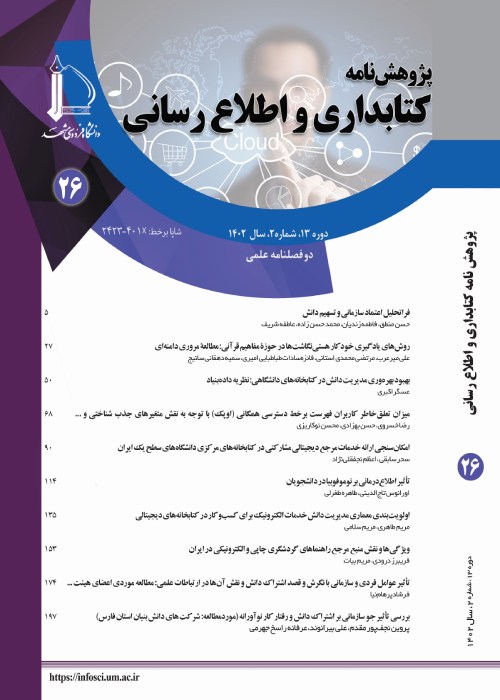Investigating the Effect of Organizational Climate on Knowledge Sharing and Innovative Work Behavior (Case Study: Knowledge-Based Companies in Fars Province)
In recent years, the reliance of organizations on the knowledge capital that originates from their employees has increased. This internal knowledge is the main factor of success and survival in today's business environment. Knowledge-oriented organizations consider knowledge sharing as an important learning strategy to achieve innovative performance. With the increasing dependence of the economy on knowledge, today knowledge is considered as the most important factor in gaining competitive advantage and achieving greater performance and profitability. All organizations -both large and small ones- consider knowledge as an essential resource in gaining a competitive advantage. Of course, Knowledge will be effective when it is shared among the employees of the organization and finally used in practice. Therefore, knowledge sharing not only makes employees share their previous knowledge with others, it also helps them to gain valuable new knowledge; It helps to create, improve and implement innovative ideas. This research aims to develop the argument that knowledge sharing strengthens the effect of the role of organizational climate on innovative work behavior; It examines the effect of organizational climate on the innovative behavior of employees and the mediating role of knowledge sharing in knowledge-based companies in Fars province, in order to properly understand the type of relationship and how organizational climate and knowledge sharing influence the innovative performance of employees in knowledge-based companies. Managers find the possibility to plan and manage more appropriate measures for the development of innovation in the company, in line with the greater productivity of the organization.
The current research is an applied research. which investigated the effect of organizational climate on knowledge sharing and innovative work behavior of employees of knowledge-based companies in Fars province in the year 2021 with an experimental method. According to Cochran's formula, the statistical sample size is 190 people. Due to the possibility of non-cooperation of some statistical samples in completing the questionnaire, the questionnaire was sent to 250 people from the statistical population. 235 questionnaires were completed by employees of knowledge-based companies. In order to cover the objectives of the research, a combined questionnaire was used, including the organizational climate questionnaire of Jane, Farmer, Pichatka, Frederick and Lukas (2015), the knowledge sharing questionnaire of Jane et al. (2015) and the innovative behavior questionnaire of Janssen (2004). In order to analyze the data and respond to the research hypotheses, confirmatory factor analysis and structural equation modeling were used by SmartPLS software. In order to check the validity of the questionnaire, formal and content validity methods were used. In this way, the questionnaire was given to 5 experts in the field of entrepreneurship, and they were asked for their opinions on the questions and the evaluation of the hypotheses, and they unanimously approved the questionnaire. Also, a confirmatory factor analysis was carried out using SmartPLS software, and its validity checked out. In order to calculate the reliability of the questionnaire, Cronbach's alpha coefficient was calculated. The partial least squares method was used to validate the model. The results of running the model in the standard estimation mode show the direction and intensity of the relationship between the variables. In order to check the significance of the relationships between the variables of the model, the bootstrap method was used. In this research, convergent validity, composite reliability, Cronbach's alpha and divergent validity were used to fit the external model.
In the case of all constructs, the average variance extracted is greater than 0.5, so there is a convergent validity. Cronbach's alpha of all variables is greater than 0.7, so the reliability is confirmed. The combined reliability value is also greater than the extracted average variance and, in all cases, it is greater than the threshold of 0.7, so the third condition is also met. The coefficient of influence of organizational climate on innovative behavior was obtained as 0.409. Also, the value of t statistic is 4.160. Therefore, it can be claimed with 95% certainty: organizational climate has a positive and significant effect on innovative behavior. The coefficient of influence of organizational atmosphere on knowledge sharing was obtained as 0.854. Also, the value of t-test is 9.522. Therefore, it can be claimed with 95% confidence that organizational climate has a positive and significant effect on knowledge sharing. The effect coefficient of knowledge sharing on innovative behavior is 0.396. Also, the value of t-test was 2.575. Therefore, it can be claimed with 95% confidence: knowledge sharing has a positive and significant effect on innovative behavior.
Based on the results obtained in this research, the organizational climate has a positive and significant effect on the knowledge sharing of employees in knowledge-based companies. Examining the relationship between knowledge sharing and innovative work behavior confirms the positive and significant effect of knowledge sharing on innovative behavior among employees of knowledge-based companies. The innovative behavior of employees is a type of motivating behavior; on the other hand, sharing knowledge is a behavior beyond the actual role of employees in the organization. Therefore, considering this fact, it can be expected that when the level of knowledge and information exchange in the organization is higher, the motivation of employees for innovative activities will increase. Therefore, the increase of information resources resulting from knowledge sharing can be considered as one of the factors of innovative work behavior in the organization. The general results of this research show the direct and indirect effect of the organizational climate (through knowledge sharing) on the innovative work behavior of employees of knowledge-based companies in Fars province. Knowledge sharing increases the effect of organizational climate on innovative work behavior. Based on this, it can be concluded that knowledge sharing behavior has a decisive role in the emergence of innovative work behavior.
- حق عضویت دریافتی صرف حمایت از نشریات عضو و نگهداری، تکمیل و توسعه مگیران میشود.
- پرداخت حق اشتراک و دانلود مقالات اجازه بازنشر آن در سایر رسانههای چاپی و دیجیتال را به کاربر نمیدهد.



